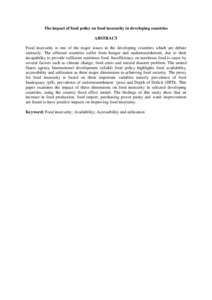Citation
Abdul Manap, Nur Marina and Sidique, Shaufique Fahmi and Ismail, Normaz Wana
(2015)
The impact of food policy on food insecurity in developing countries.
International Journal of Economics and Management, 9.
pp. 181-191.
ISSN 1823-836X
Abstract
Food insecurity is one of the major issues in the developing countries which are debate seriously. The affected countries suffer from hunger and undernourishment, due to their incapability to provide sufficient nutritious food. Insufficiency on nutritious food is cause by several
factors such as climate change, food crisis and natural disaster problem. The united States agency International
development (uSaId) food policy highlights food availability, accessibility and utilization as three major dimensions in achieving food security. The proxy for food
insecurity is based on three important variables namely
prevalence of food Inadequacy (pfI), prevalence of undernourishment (pou) and Depth of Deficit (DFD). This paper examines the impact of these dimensions on food insecurity in selected developing countries, using
the country fixed effect model. The findings of this study show that an increase in food production, food import, purchasing power parity and water improvement are found to have positive impacts on improving food insecurity.
Download File
![[img]](http://psasir.upm.edu.my/46606/1.hassmallThumbnailVersion/The%20impact%20of%20food%20policy%20on%20food%20insecurity%20in%20developing%20countries.pdf)  Preview |
|
Text (Abstract)
The impact of food policy on food insecurity in developing countries.pdf
Download (5kB)
| Preview
|
|
Additional Metadata
Actions (login required)
 |
View Item |

